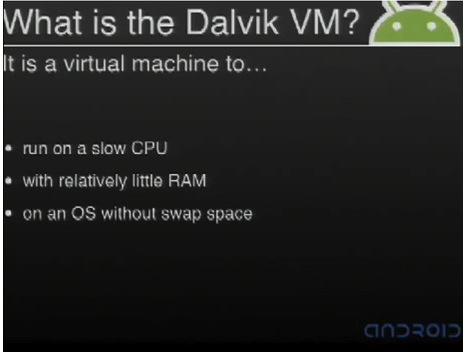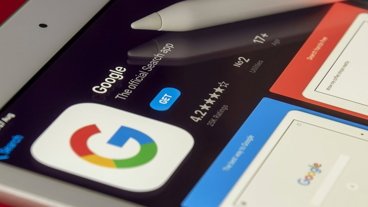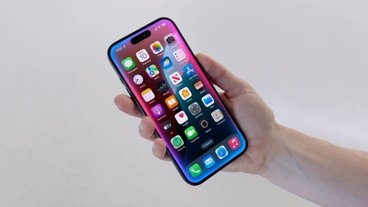Oracle's Java infringement case against Google's Android is reportedly nearing a reversal of last year's original finding that defended Android. Meanwhile, Google is focusing new attention on Chrome web apps rather than a continuation of Android's original "embrace and extend" Java strategy.
Two moves announced today cast new doubt on the future of the current state of Android as a Java-like platform for running Dalvik virtual machine middleware on mobile devices with limited resources, the company's original strategy for Android (above).
Android Dalvik in hot Java
The first comes from the United States Court of Appeals for the Federal Circuit. Florian Mueller of FOSS Patents drew early attention to two reports indicating that the court will likely reverse last year's ruling by District Judge William Alsup.
That decision had stated that Google's copying of Oracle's Java API code for use in Android wasn't an infringement of Oracle's rights because the appropriated code wasn't protected by copyright. With a reversal, Oracle can sue for damages and seek to force Google to make Android compatible with Java.
Back in the early 1980s, Apple similarly sued copycat vendor Franklin for cloning its Apple II code. It initially lost before the ruling was overturned by an appeals court that found Apple's code was worthy of copyright in a landmark case that shifted the industry.
If last year's ruling in Google's favor is indeed overturned, there may still be an opportunity for Google to argue that its use of Oracle's Java code was permitted as fair use. In any case, losing the appeal would greatly complicate Google's future plans for Android.
Google moves toward Chrome
With the Java-like architecture of Android's app platform under renewed scrutiny, Google moved to steal headlines with the announcement today that the former leader of Android, Andy Rubin, is now working on robots, a media distraction on the order of Amazon's "Prime Air" stunt for Cyber Monday.
Additionally, a report by Emil Protalinski of The Next Web states that Google is working to bring Chrome web apps to Android and iOS devices as early as next month.
Essentially, Google's plans for Chrome would allow developers to create web-based apps that could run on virtually any mobile device, leveraging the middleware of the web via JavaScript rather than the Java-like virtual machine used by Android.
Google has succeeded in promoting the widespread adoption of Android at the expense of Oracle's own Java (which was similarly on more than 80 percent of phones prior to Android). However, despite replacing the fragmented mess of various Java Mobile implementations with the monoculture of Google's own Dalvik VM, Android hasn't created a rich, successful ecosystem for mobile apps comparable to Apple's iOS App Store.
Shifting away from Android's Dalvik and toward Chrome would allow Google the opportunity to reassert control over the mobile app platform, not just on devices that shipped with Android, but also the other, more valuable half of the mobile market that's using iOS, a market segment that dominates education, the enterprise and affluent users who make purchases.
Additionally, by focusing app development on web apps via Chrome, Google can also move away from Android as a development platform, distancing itself from the core of Oracle's complaint.
Google has also made no secret of Cordova, its plan to host Chrome web apps on Android, a strategy outlined by Mobile Chrome Apps software engineer Michal Mocny this summer (below).
Mobile web apps
Apple already supports web apps on iOS, allowing developers to wrap a generic, standards based mobile web app to appear and behave similarly to a native iOS app written in Objective-C to Apple's proprietary Cocoa Touch development platform.
However, developers including Facebook have backed away from cross platform mobile web apps as a viable strategy, citing the performance and additional sophistication that can be achieved with native code."The biggest mistake we made as a company was betting too much on HTML5 instead of native" - Mark Zuckerberg
Last year, Facebook chief executive Mark Zuckerberg said "we've had a bunch of missteps" in deploying mobile Facebook apps, and that "the biggest mistake we made as a company was betting too much on HTML5 instead of native [platforms]." He added "Native [platform development] is going to be the approach that we go with for iOS and Android" and that "We're betting completely on it."
Apart from Android's Dalvik, Google lacks a substantial native platform code strategy, greatly preferring to use the web as the front end for its popular services ranging from Gmail to Google Docs. In contrast, Apple prefers native apps on iOS and OS X, having only recently created a web version of its iWork suite, and directing any iOS users who seek to access iCloud via the web to use Apple's native iOS apps instead.
Google's move to focus on Chrome was easy to predict after the company replaced Rubin as the head of Android with Sundar Pichai, who had previously worked on Google's Chrome browser and led Chrome OS development.
The move to 64-bit processors in future mobile devices would also be much easier with Chrome, enabling Google to transition just the Android brand to new hardware without having to invest further in Android's defining Dalvik architecture in order to bring it into compliance with Oracle's Java standards.
 Daniel Eran Dilger
Daniel Eran Dilger







-m.jpg)






 Malcolm Owen
Malcolm Owen
 Amber Neely
Amber Neely


 Christine McKee
Christine McKee

 Chip Loder
Chip Loder
 Marko Zivkovic
Marko Zivkovic









114 Comments
"Oracle's Java infringement case against Google's Android is reportedly nearing a reversal of last year's original finding that defended Android." My fingers are crossed! Go Larry, spare no evil people.
The natives will succeed !
even more fragmentation from Google, so any developers they convinced to develop for android phone will now have to support yet another version of their programs and deal with all the various issue associated with the new interface.
Yeah this is going to go well for them, But if you were in their shoes right about now with all the lawsuits both in the software and hardware worlds around Android and loosing out on the mobile market from an ads placement stand point, they have to do something which is platform agnostic. But we know how well that going to suck for the users...
The best part is they sent Andy off to play with Robots, that is Corporate speak for "He is on specially assignment" thus on his way out but they making him work off his contractual requirements, no golden parachute for him.
Should I be breaking out the champaign yet that the fall of Android is upon us?
Holy smoke! So, in the end it won't be Apple or Microsoft that will kill Android (is it is now) but Google itself. I am going to play analyst right now and peer into my crystal ball and pull some BS out of my !%^% (analyst must be the best job in the world). I predict that five years from now Android on mobile devices will be only a very small fraction of what it is now. Samsung which is already distancing itself from Android, and is the largest producer of Android products, will finally transition to their own internal OS. Along with this exodus will be many of the third and fourth tier companies that bloat Android's sales figures with rock bottom price cheap products, because they only use Android because it is free. If they have to pay for a Java license then they will find another free solution. Most likely go back to their own in-house solutions that they used to run. I expect that Microsoft will actually be the biggest winner of this fall-out as their old whipping boys will come crawling back to Microsoft rather than paying for a version of Android that Google will no longer be supporting and they don't have the expertise or money to develop themselves. If you like I also do palm readings. :)